marriage equality
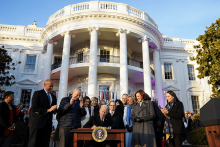
President Joe Biden signed the Respect for Marriage Act into law on Tuesday at a jubilant celebration that featured singer Cyndi Lauper performing “True Colors” in front of thousands of supporters on the White House lawn.
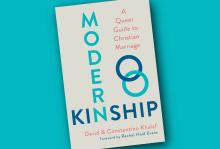
THE CHURCH THAT baptized me and was my spiritual home does not provide marriage counseling to LGBTQ couples. I doubt it even allows openly LGBTQ people to join its congregation. This treatment isn’t unusual: For years, many LGBTQ people have been denied true belonging and dignity in church bodies worldwide. Their romantic partnerships have been damned by clergy and discredited by loved ones. While heterosexual couples have been given pastors’ blessings and guidance, many LGBTQ couples have been abandoned to the harshness of life’s challenges.
David and Constantino Khalaf know this struggle well and don’t want queer Christians interested in finding a partner to have to figure out the complexities of faith, marriage, and commitment on their own. That’s why they have bravely written the book Modern Kinship: A Queer Guide to Christian Marriage.
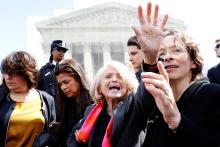
Edith Windsor died at the age of 88 this week. Her legacy in bending the arc ever more toward justice — nationwide and indeed within the faith community — cannot be overstated.
In 2013, Edie won her Supreme Court case in a landmark victory for LGBTQ rights in the United States. I was newly out, trying to become a minister in a denomination that had just begun allowing the ordination of LGBTQ people. Even as my church still struggled to be fully inclusive toward LGBTQ people, many of us saw hope and possibility in stories like Edie’s. That hope kept us faithful — both to God and to our own queer identities.

After a quarter-century, the Rev. Barry Lynn is retiring as head of Americans United for Separation of Church and State.
In court, in congressional hearings, and on cable television, Lynn has led the fight against school-sponsored prayer, religious symbols on public property, and any law that allows government to privilege people of faith.

As an undergraduate student at a Christian university, I realize that my degree of experience within American social trends is limited to the last two decades. However, my age does not disqualify my faith as a Christian, nor should my faith as a Christian disqualify my faculty of reasoning.
I cannot speak as one who knows the mind of God, but as a Christian I have been called to have the mind of Christ. And through careful inspection of the texts left for us, it is possible to discern what a Christ-like mind is — what a Christian mind is supposed to be.
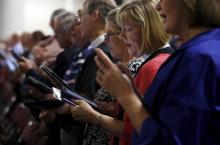
By an overwhelming majority in both of its legislative houses, the Episcopal Church made history July 1 by making marriage for same-sex couples available throughout the church.
The actions on marriage equality came after decades of progress toward fully including LGBT Episcopalians in the work and witness of the church.

The debate is over.
In a landmark decision, the Supreme Court decided this morning that marriage was a fundamental right for all couples regardless of gender. All Americans who wish to can now marry the same-sex partner they love. Every state law that bans such marriages is now dead. And it is over. It is finished. This debate, at long last, is done.
This is a good day to be present. I want to document this day into my memory, so I might tell my children about it later. Although at 25 I can’t possibly understand all this decision entails, there may be a day down the road when I stand tuxedoed and teary-eyed and holding the hands of another, and I want this memory to color that moment. I want to feel the gift of it.
But this day also brings up a lot of complicated feelings for me, too. I am, after all, a follower of Jesus, and many in this family of Christians are not celebrating with me. They are unsure of what to say, uncertain of what the future holds.

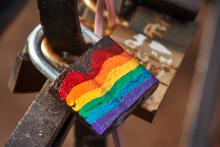
BY CHANGING THE definition of marriage in its constitution from “between a man and a woman” to “between two people, traditionally a man and a woman,” the Presbyterian Church (U.S.A.) has joined a number of other religious groups in the U.S. in allowing same-sex marriage.
In so doing, the 1.75 million-member denomination completed a dramatic turnaround on marriage equality. In 2012—at a time when same-sex marriage was legal in only a handful of states—the 220th PC(USA) General Assembly was so deeply divided on the issue that it merely called for two years of “serious study and discernment” of Christian marriage.
The 2014 General Assembly—with nearly two dozen states by then having legalized same-sex marriage—voted 429-175 to recommend the constitutional change. By March of this year, the requisite majority of the PC(USA)’s 172 presbyteries (regional governing bodies) had ratified the proposal.
Reaction to the change was immediate, and predictable.
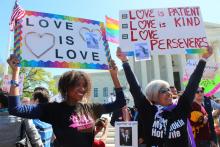
WASHINGTON — As the nine Supreme Court justices took up the vexing question of a constitutional right to same-sex marriage on Tuesday, the case came down to two competing visions of marriage: what it’s been, what it should be, and who gets to decide.
Outside the court, hundreds of demonstrators echoed both sides: Amateur evangelists and anti-gay zealots with signs proclaiming, “Man & Woman: United for Life, Open to Life,” and throngs of gay rights supporters chanting “Love Must Win!” to drown out the sidewalk preachers with their megaphones.
Yet ultimately, beyond both the arcane and real-life arguments over the state’s sanction of private relationships, the court must decide the very nature and purpose of marriage — or at least which nature will be reflected in civil law.

For most of recorded history, Isis was an Egyptian goddess, a benevolent type who cared for widows and orphans, cured the sick and even brought the dead back to life.
This year, the world met the other ISIS.
The rise of the so-called Islamic State, variously known as ISIS or ISIL, dominated headlines in 2014 as a self-proclaimed caliphate sowed death and destruction across Iraq and Syria. For some, the group confirmed their worst fears about Muslim extremists, bent on killing religious minorities and subjugating women in a quest for domination that included leveling villages and beheading hostages.
The terror wrought by the Islamic State reflected a sense of turbulence that upended international news in 2014. But it was not the only source of unrest. The Ebola virus in west Africa put the world on edge, and a bloody war between Israelis and Palestinians in Gaza, kidnapped schoolgirls in Nigeria and the slaughter of more than 100 children at a military school in Pakistan added to the mix.
At home, America wrestled with police brutality as grand juries declined to prosecute officers in the deaths of unarmed black men in Ferguson, Mo., and New York City. From botched prison executions to a stream of desperate migrant children flooding America’s southern border, things felt troubled, disorienting, always on the verge of breaking apart.
Religion played a large role in those stories, and in other major headlines from 2014:
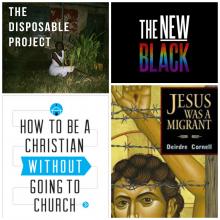
THROUGH THEIR EYES
In 2011, Raul Guerrero provided 100 Kodak disposable cameras and taught basic photography skills to nine young students in the Newlands area of Moshi, Tanzania. The Disposable Project book brings together their images of their community, with text by Guerrero. the-disposable-project.com
JOURNEYING
“Migration has been, for centuries, not only a source of controversy but a source of blessing,” Deirdre Cornell writes in Jesus Was a Migrant. Inspired by ministering among immigrants in different settings, this is a beautifully written set of deeply humanizing reflections on the immigrant experience and Christian spirituality. Orbis Books

Like lots of college students, Lauren has a smartphone loaded with some of the most popular apps around — Facebook, Twitter, and eBay. And like a lot of unbelievers, she asked to not use her full name because her family doesn’t know about her closet atheism.
One of the apps she uses most regularly is YouVersion, a free Bible app that puts a library’s worth of translations — more than 700 — in the palm of her hand. Close to 115 million people have downloaded YouVersion, making it among the most popular apps of all time.
But Lauren, a 22-year-old chemistry major from Colorado, is not interested in the app’s mission to deepen faith and biblical literacy. A newly minted atheist, she uses her YouVersion Bible app to try to persuade people away from the Christianity she grew up in.
“I know of a lot of atheists who have come to their nonbelief by actually reading the Bible rather than just the fluffy stories they choose to tell you about in church,” she said. “Reading the full story with all its contradictions and violence and sexism, it should make you think, ‘Is this really what I believe in?’ At least it did for me.”
Lauren is not alone. No one knows how many atheists have downloaded YouVersion and other smartphone and tablet Bible apps, but it is enough that word of the phenomenon has reached the Edmond, Okla., headquarters of LifeChurch.tv, the evangelical megachurch that created the app.
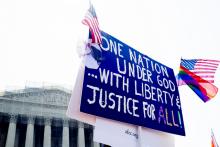
The words above the Supreme Court read, “Equal Justice Under the Law.” This week, two Supreme Court outcomes dramatically affected the reality of those words.
On Tuesday, in a 5-4 decision, a key component of the historic Voting Rights Act of 1965 was struck down, jeopardizing equal justice under the law especially for black, Hispanic, and low-income people whose voting rights have historically been assaulted and have continued to be suppressed as recently as the 2012 election. In fact, Section 4 of the Voting Rights Act — which required parts of the country that have been especially egregious in racially motivated voter suppression to get federal approval of any changes in their voting laws — was specifically used in the 2012 election to prevent new voter suppression. That provision has now been struck down, and efforts to increase barriers to voting are already underway in several states, especially in the South, that would suppress the future votes of Americans of color, especially those with lower incomes.
Equal justice under the law lost on Tuesday, June 25. The Supreme Court’s decision was morally shameful. ...
Contrast Tuesday’s decision with the final ones we saw handed down this week. ... I, along with a growing number of people in the faith community, believe that equal protection under the law is essential for our gay and lesbian friends and family members. While some Christians are conflicted about the theological issues involved, or even are unable to support homosexuality on a religious basis, they also don’t want churches to be the ones standing in the way of civil rights.
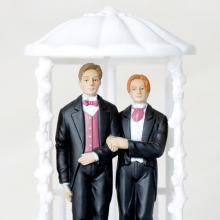
CANTERBURY, England — The British government unveiled a proposal on Tuesday that excludes the Church of England and the Church in Wales from planned legislation to allow same-sex couples to marry in churches.
Culture Secretary Maria Miller told Parliament the new plan would allow gay and lesbian couples to marry in some churches, synagogues, temples, and mosques, but definitely not in the established church, where both the outgoing and incoming archbishops of Canterbury insist that marriage remain between a man and a woman.
"We will write on the face of the bill a declaration that no religious organization, or individual minister, can be forced to marry same-sex couples or to permit this to happen on their premises," Miller told the House of Commons.
Religious groups, including Quakers, Unitarians, and some liberal Jewish groups, welcomed the news because they favor same-sex marriage. The Church of England, the Church in Wales, the Roman Catholic Church, most Muslims, and Orthodox Jews oppose the move.